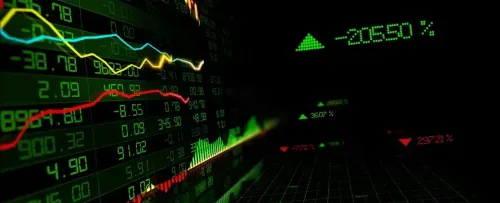
If you think losing a trade stings, try losing money to the taxman! For South African forex traders, the South African Revenue Service (SARS) taxes all forex trading income, and this can often create a major tax liability if you’re unprepared.
And while traders spend their days chasing forex trading profits, a fat tax bill can end up taking away a huge chunk of that hard-earned money.
The worst part is that it doesn't have to be complicated. What you need is a clear understanding of how forex trading is taxed in South Africa, including the expenses involved, and then use the options available to bring it down.
Here’s everything you need to know about forex trading tax in South Africa and the tax implications for South Africans so that you can make informed decisions.
Is Forex Trading Legal in South Africa?
Yes, forex trading is perfectly legal in South Africa. It is regulated by the Financial Sector Conduct Authority.
However, traders should note that profits are taxed differently from a tax-free savings account or other products.
The Biggest Forex Trading Trap South African Traders Fall Into
Here’s what happens to some traders. They sign up with an offshore broker. They make a few withdrawals into their South African account. And then they assume—wrongly—that SARS isn’t watching.
But that’s just not the case. Even if the profits sit in a foreign account, once you’re a tax resident in the country, the South African Revenue Service applies its tax obligations on worldwide income.
This means you need to declare your forex trading profits as part of your estimated taxable income each year.
So the problem isn’t that forex is “illegal”—it’s not. The problem is that most traders either don’t declare at all or they declare in a way that misses key deductions.

How Offshore Brokers Can Complicate Things
Many forex traders think that if they use offshore brokers, then the South African Revenue Service will not come to know about their Forex trades. That's not how it works.
South African residents are taxed on any income they make, anywhere in the world, with no exceptions. Offshore brokers end up making the reporting process even harder.
The first problem is exchange control rules. South Africa places strict controls on movement of money in and out of the country. Banks routinely flag and report international inflows to the Reserve Bank—and the South African Revenue Service eventually sees those numbers, so maintaining detailed records is essential.
The second problem is that of currency conversion. Foreign brokers typically hold balances in foreign currencies, like the USD or the EUR. But for SARS, all transactions need to be reported in rands.
The conversion happens using the official exchange rate prevailing when the transaction took place. If you make even a small mistake in tracking and converting the money correctly, your tax returns and bank statements won't match—and that can easily trigger an audit.
International transfers can cause further issues. Brokers charge fees, and banks take a cut of the money based on the transaction size. Those costs are tax-deductible and legitimate deductions from your taxable income, but only if you track them meticulously. Many forex traders miss out on claiming deductions for these items, which increases their overall tax liability unnecessarily.
Why Are Forex Profits Taxable?
If you’re trading regularly, SARS sees you as running a business—whether you like that label or not. Any forex trading profits you make from these transactions thus become taxable at your personal marginal rate, which can be anywhere between 18% to 45%.
And here’s the thing—SARS doesn’t care that you lost money on Tuesday and won it back on Thursday. It's your responsibility to track and collate those records with proper exchange rate conversions to South African Rand.
Understanding Forex Trading Tax South Africa: Entities, Thresholds, and Rates
Now, the good news is that there are some options to structure things that can potentially reduce your SARS forex tax. Unfortunately, most forex traders don’t use them—either because they don’t know they exist or because they assume it’s too much hassle. But knowing these and implementing them alongside your trading strategies can make a huge difference.
Individuals:
If you’re trading in your own name, you’re taxed according to the standard individual income tax tables. There are tax-free thresholds: R95,750 if you’re under 65, R148,217 if you’re between 65 and 74, and R165,689 if you’re 75 or older.
If your total taxable income falls below the relevant threshold, you won’t pay any income tax.
From there, SARS applies progressive brackets, meaning the more you earn, the higher the percentage on that portion of income. Here are the rates for different brackets:
| Taxable income (R) | Rates of tax (R) |
|---|---|
| 1 – 237 100 | 18% of taxable income |
| 237 101 – 370 500 | 42 678 + 26% of taxable income above 237 100 |
| 370 501 – 512 800 | 77 362 + 31% of taxable income above 370 500 |
| 512 801 – 673 000 | 121 475 + 36% of taxable income above 512 800 |
| 673 001 – 857 900 | 179 147 + 39% of taxable income above 673 000 |
| 857 901 – 1 817 000 | 251 258 + 41% of taxable income above 857 900 |
| 1 817 001 and above | 644 489 + 45% of taxable income above 1 817 000 |
Companies:
Unlike individuals who are taxed according to the various slabs, a registered company pays a flat 27% corporate tax on profit.
This makes it one of the cleanest options for forex traders who want to separate their personal and professional money. Just make sure that the company is set up properly with bank accounts, CIPC registration, and proper bookkeeping.
Trusts:
Trusts are taxed at a flat 45% tax rate except in some very specific scenarios (such as a trust set up for someone with a disability or similar condition). For most traders, setting their business up as a trust will end up creating a huge hole in their pockets.
Small Business Corporations (SBCs):
This is an overlooked gem. An SBC may result in lower taxes than individuals and trusts at most income levels. Here is a summary of the tax rates:
| Taxable Income (R) | Rate of Tax (R) |
|---|---|
| 1 – 95 750 | 0% of taxable income |
| 95 751 – 365 000 | 7% of taxable income above 95 750 |
| 365 001 – 550 000 | 18 848 + 21% of taxable income above 365 000 |
| 550 001 and above | 57 698 + 27% of the amount above 550 000 |
Deductible Expenses That Traders Forget
South African law allows you to make several deductions to your income before it becomes taxable. Knowing these can save you a lot of money.
A few examples:
-
Office rent (yes, even if it’s your spare room—portion counts)
-
Trading software and subscriptions
-
Computer equipment depreciation
-
Internet and phone bills (split use)
-
Bank charges and broker fees
-
Business travel
Each of these can be removed from your income tax bill. Skip them, and you’re effectively tipping SARS.
Understanding Provisional Tax Payments
As a forex trader, you’re not getting any payslips which has PAYE already deducted. This is why SARS treats you as a provisional taxpayer. This means you will have to pay tax twice a year, and optionally a third time as well.
Not paying tax on time ends up causing penalties and interest charges. That’s just money you’ll end up losing for no reason at all. Traders must be vigilant regarding their provisional tax payments.
How Traders Misclassify Themselves
Here’s another big mistake many traders make: Thinking forex profits are “capital gains"? They’re not. Unless the money is genuinely invested in long-term holding positions, SARS will treat forex profits as income. So when someone says, “Just pay capital gains tax,” they’re giving bad advice.
3 Legal Ways to Reduce Forex Trading Tax in South Africa
Now to the good part. You can’t dodge taxes, but you can definitely minimize them legally.
1. Structure as a Small Business Corporation
Many South African forex traders can easily register as a Small Business Corporation (SBC) instead of paying taxes as an individual. This is one of the easiest ways to reduce your tax burden.
As discussed earlier, SARS gives SBCs a far better deal than it gives individuals. Let’s take just one example. Let’s say a trader makes R400,000 in taxable income for the year. As an individual, SARS would apply the progressive brackets.
The first R95,750 would be tax-free. The next chunk up to R237,100 will be taxed at 18%, then the portion between R237,101 and R370,500 will be taxed at 26%, and the portion from R370,501 to R400,000 will be taxed at 31%.
The total tax liability will come to roughly R85,000. That leaves the trader with about R315,000 after tax—an effective tax rate of around 21%.
Now, let’s compare this to a scenario where the trader was registered as a Small Business Corporation (SBC). The first R95,750 is again tax-free. The next portion up to R365,000 will be taxed at only 7%, which comes to about R18,850.
From R365,001 to R400,000 will be taxed at 21%, which is just over R7,000. The total tax bill comes to approximately R26,000. The trader ends up keeping about R374,000 after tax—an effective rate of only 6.5%. In pure money terms, that’s an additional R60,000 in their pocket.
Of course, becoming an SBC isn’t all that simple. There are registration procedures, proper financial records need to be kept, and there are requirements under the Companies Act that must be complied with.
The trader will need to appoint a registered accountant, file annual returns, and follow a more structured approach to their finances. But overall, a few thousand rand a year in compliance costs can save you tens of thousands in income tax.
2. Claim Every Possible Deduction
The Income Tax Act specifies that “expenditure incurred in the production of income,” along with proper documentation (where required), can be deducted from taxable income. In other words, anything that helps you make money from trading is most likely going to be deductible.
Here are some important examples. Trading software subscriptions, data feeds, laptops, office chairs, and even electricity bills for your trading desk setup are all deductible.
Depreciation on your laptops and terminals, internet and phone bills (at least the portion tied to your trading work), broker fees, bank charges, and even training programs that help you trade better can be used to pay less tax.
The important thing is to keep records. Provide SARS with invoices, receipts, and statements proving each and every expense.
3. Understand Your Role as Provisional Tax Payers
Traders are provisional taxpayers, which means you need to pay your taxes twice a year, in February and August, with an optional third payment in September to square up. Making sure that you meet these deadlines ensures you don’t lose money on penalties and interest charges.
The smart option is to prepare well for your provisional tax. Open a separate “tax account” at your bank and move a set percentage of profits into it so that you don’t lose sight of your tax liability. It helps you to always pay on time.
Another idea is to be conservative and pay higher tax upfront than needed so that you don’t end up getting a surprise at the last minute.
Managing your provisional tax is just like risk management in trading. Ignore it, and you’ll be forced to liquidate positions at the wrong time to pay the taxman. Plan for it, and you keep your capital base stable, ready for the next opportunity.
The Real Cost of Ignoring SARS Forex Tax Rules
The sad fact is that some traders lose more forex trading profits to tax than to bad trades. After all your technical skill and mastery at crafting a winning strategy on forex trades, ending up with little to show just because you didn’t figure out how to navigate the rules of forex trading in South Africa and the tax implications.
Here’s the truth that needs to be said—knowing your tax laws in South Africa is just as important as knowing your entry and exit rules in trading.
What Traders Should Actually Do Next
Start by figuring out if you qualify for SBC tax rates. Track every single trading expense. Open a separate tax account and set aside a fixed portion of your profits every month. And if it is becoming unmanageable, don’t hesitate to pay a professional for some advice.
Treat Tax Planning Like Trading the Forex Market
The tax landscape in South Africa changes often—new budgets, new rules, new thresholds. Forex traders who treat tax obligations like an afterthought will always be playing catch-up. Those who treat it like part of their risk management will keep more of what they earn—and that’s the real edge worth holding onto.




